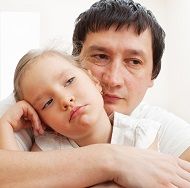Article
Pediatric Stroke: Parents Get PTSD
Author(s):
It may be common sense that parents of children who have a stroke are likely to be upset and worried, but a new study from Boston Children's Hospital shows that parental stress often rises to the level of post-traumatic stress disorder (PTSD). The implication for clinicians is that these parents need treatment too-and that their PTSD anxiety may cause them to avoid having more to do with the medical profession, which could have a negative impact on kids' care.

It may be common sense that parents of children who have a stroke are likely to be upset and worried, but a new study shows that parental stress often rises to the level of post-traumatic stress disorder (PTSD).
The implication for clinicians is that these parents need treatment too—and that their PTSD anxiety may cause them to avoid having more to do with the medical profession, which could have a negative impact on kids’ care.
In research presented at the American Heart Association/American Stroke Association’s International Stroke Conference, Laura Lehman, MD of Boston Children’s Hospital reported on the phenomenon.
It is already known that parents can develop PTSD if a child has cancer, a traumatic brain disorder, or goes through an organ transplant. The researchers figured parents of children who had strokes might also develop PTSD. “I saw that some of these parents were reliving the event, and wanting to avoid going to places that reminded them of it,” Lehman said, discussing the study today. They also appeared to shows signs of depression, and feelings of guilt. Some told her they had become hyperactive, or had sleep disturbances.
Lehman and colleagues used standardized psychological diagnostic surveys administering them to both parents and the children to see if they had symptoms of the disorder.
The group also surveyed children for other emotional problems, such as anxiety and depression. Of 33 parents in the study group 8 parents of 7 children (24% of the parents) met the criteria for PTSD.
Half of those children had more complicated illness, including moyamoya and congenital heart disease. That might have suggested that it was the severity of the child’s illness that triggered PTSD in the parents. But half of the children whose parents did not have PTSD also had more complicated medical conditions post-stroke.
Developing PTSD could be related to factors in inherent psychological makeup of the parent or patient. “We just don’t know yet,” Lehman said.
As for the children, 2 kids (22%) had clinically significant levels of anxiety, Lehman said, and 4 kids (44%) showed at least one sign of the criteria used to diagnose PTSD. (In addition to having been through a stressful event, those are having intrusive thoughts, showing avoidance behavior, having a negative change in cognition or mood, or a change in arousal or reactivity.”
In discussing the findings at a presentation today, Lehman said her group is now working on finding effective ways to treat the condition both in the parents and the children.
Obviously, she said, some methods used for treating battlefield PTSD—such as reliving the event through video simulations—were likely inappropriate for these parents and children, she said. But is equally clear that they need help, Lehman concluded.




